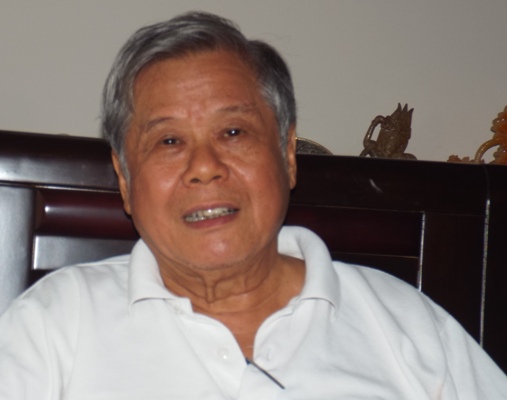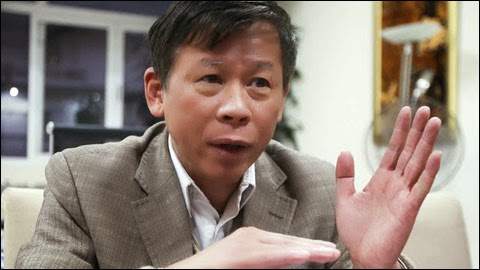|
The challenges of
Dr. Dang Kim Son,
former director of the Institute of Policy and Strategy for Agriculture and
Rural Development, and Dr. Vu Trong Khai, former Rector of the School for
Training of Rural and Agricultural Management Experts, point out the
challenges facing Vietnam’s agriculture and farmers.

Agriculture is the pillar for social
stability of
Dr. Dang Kim Son: Our agricultural products are good, but they are only good in quantity, not quality, so their competitiveness is low. Our agricultural production is falling into the vicious circle like this. The more production grows, the lower the price because of oversupply. It happens to all kinds of agricultural products. Our agricultural production is excessive not because the markets do not need the products but because we do not produce the new products that the market requires. The countries that purchase our agricultural products have been doing so for almost 30 years. The situation is tougher because of the appearance of new agricultural exporters like To seek the new markets, we must have good and diverse products. The matter now is that it is time to switch to a new agriculture that we call "restructuring agricultural production." Dr. Vu Trong Khai: We are seeing the fact that agriculture is in recession. Farmers have to abandon the fields and go to the city to do anything, even jobs without skills, to still earn higher income than farm work. However, the lives of these people in urban areas and industrial zones are very poor. 
Dr. Vu Trong Khai
In our country, the people living by agriculture account for 70% of the population. At least 57% of the workforce works in the agricultural sector, but this sector generates less than 20% of the country’s GDP. Therefore, they only benefit from that number. GDP per capita in rural areas is only $200 compared with the national average of $1,600/person. According to a survey by the The vicious cycle goes on and on. Low productivity leads to low income; low income leads to low savings; little saving leads to small investment; and small investment leads to low productivity... Thus, the achievements of agriculture, the great role of agriculture as the "pillar" became a screen that obscures the misery of farmers. They have to sacrifice too much. In my opinion, agricultural renovation is actually untying the potential; like a tightly compressed spring, after being released, it springs up at full throttle to return to its original state, not more. In other words, this policy is not effective anymore so it cannot create the ability to grow in quality. We had the “untying” policy but we did not have the policy of motivation. The motivation policy is completely different to the “untying” policy. It takes the role of pushing development to a new level, improving quality, increasing competitiveness and meeting the increasing requirements of the market. Therefore, the policy of "motivation" should be made with a scientific and practical basis; and it requires qualified policy makers who do their job conscientiously and courageously. The facts always change and the policy must also change to adapt. In the context of international economic integration, policy makers must understand the WTO rules and international practices. The policy implementation capacity of the public administration and civil servants must be improved. The conscience and courage of the policymakers are shown through their firm stuff to avoid the influence of interest groups, leading to sacrifice the interests of farmers. Dr. Vu Trong Khai, you have many studies of agricultural and rural development. Could you talk briefly about the biggest problem of Dr. Vu Trong Khai: With the small production scale at present, each household has only 0.8 hectares of cultivation land on average. Farming is still a "hereditary" profession, which is based on experience. Processing and trade remains the same, without association with a value chain. The economy in general and agriculture in particular are involved in the global value chain in a disadvantageous position. Thus, with low added value, more deeply integrating into the global market, agriculture increasingly brings negative socio-economic and environmental consequences, and the farmers get poorer. Why do we fall into this situation? There are many reasons. After joining the World Trade Organization (WTO), we have not taken advantage of global integration but have been affected by the negative impact of globalization. At the micro level, an important cause, which is "the cause of all causes," is that we're missing the "big farmers" and agricultural administration in a professional manner. In other words, our institutions have not formed a team of professional farmers and large agricultural production. As you said, the more we export rice, the more losses we get. So why do we keep producing rice and exporting 6-7 million tons of rice annually? Dr. Dang Kim Son: First of all, rice production itself is an important advantage of 
Dr. Dang Kim Son
However, in terms of economic efficiency, we need to recalculate. For years we have not calculated the cost of the environment. Wet rice is a water and soil intensive variety. Rice is among the plants producing large carbon emissions. If all of these things are taken into account, production of wet paddy is not highly profitable. Indeed in other countries, the governments heavily subsidize wet rice cultivation because it is considered “political plant” rather than “economic plant” to maintain social stability, create jobs and ensure food security for the poor. One of the reasons why we continue to maintain rice production is that we have a tradition of production of rice, one of the oldest rice civilizations of the world. Our people have produced rice for many generations so it is hard to switch to other crops overnight. Dr. Vu Trong Khai: If we don’t plant rice, what crops should we cultivate is a tough question, especially for the For farmers, if the rice prices are low or they cannot sell rice, they can keep it to eat. The other crops don’t have such advantage! A big problem for agriculture at present is the burden of fees and charges on agricultural products. Why does this absurdity happens? Dr. Dang Kim Son: I would confirm that the central government does not want that. The government knows clearly that the contribution of farmers is not important for the increase of budget revenue. The State’s goal is to stabilize the countryside and the lives of farmers. But there are state bodies with the cumbersome apparatus and civil servants whose salary is low, so they create "hurdles" to extort money. Besides, it is the bureaucratic attitude of officials who want to ban to easily control, to avoid risks in management, regardless of difficulties of the producers and traders. Therefore not only the central state but also the people have to struggle against bureaucracy. The renovation process itself must also cope with this. Breakthrough in institutions is the most important breakthrough of the process of economic restructuring. Dr. Vu Trong Khai, you have said that the interests of farmers and agriculture have not been respected and guaranteed though we have policies on this. Could you point out some "evidence"? Dr. Vu Trong Khai: The 1993 Land Law only set limits for the area of land used by farmers, not enterprises. The duration of land use rights for farmers is only 20 years for annual crops while enterprises can use land for 50-70 years, depending on the project. That is, for the same behavior of using land for agricultural production and business, farmers can use up to only 2-3 hectares for 20 years, while the restriction is not applied to businesses. According to the 1993 Land Law, farmers only receive compensation for land use rights under state prices when their land is revoked to give to investors. Farmers don’t have the right to bargain. But after the land is allocated to investors and the State wants to take back to build infrastructure or lease it to someone else, the State has to negotiate the prices under the market mechanism. Some tycoons emerged in Investors have dominated the policy; why have the interests of farmers been sacrificed? There are many similar painful stories that I can’t tell in this talk. The big issue that I want to say is, there are many policies on agriculture and farmers that need to be reviewed. More importantly, I think we need to reconsider the current industrialization in Could you clarify these problems? Dr. Vu Trong Khai: In other countries, they invest in industrial zones for the goals of economic development and also social objectives like attracting labor in the rural areas in order keep farmers in their hometown. In Secondly, our industrial zones only create jobs not life, as they are not tied to residential areas and people. Rural laborers working in industrial zones have temporary lives. They don’t have kindergartens, schools, and hospitals. If they have children, they have to send them back home to their grandparents. Thus, how can they work in peace and contentment? So farmers leave home to be workers, but they always return by keeping their fields. They don’t dare to sell or rent agricultural land in the long-term, but keep it or lease it for a few years only. They are always ready to come "back home". Thus, we cannot realize the objective of transferring manpower from agriculture to industry and our agricultural production is still on a small scale. VNN |
Thứ Ba, 13 tháng 10, 2015
Đăng ký:
Đăng Nhận xét (Atom)
Không có nhận xét nào:
Đăng nhận xét